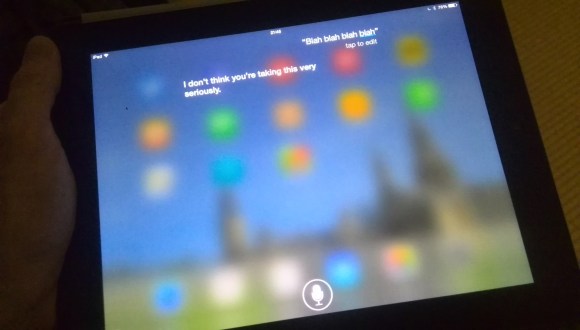
On 30 April, a joint announcement was made by Apple, IBM and the nation’s private postal service Japan Post regarding a new project that aims to change the lives of Japan’s aging population.
The three companies are combining their expertise to develop a line of iPads with specialized apps for senior citizens. Designed by IBM in conjunction with elderly care services in the works by Japan Post, it is hoped that the tablet computers will help to reduce the burden on younger generations as they care for an increasing number of aged family members.
Apple will be supplying the hardware in the form of an iPad, a device whose interface is so intuitive and simple that my own daughter was effective with it at about age one. Of course, seniors will be in need of more features than a Goodnight Moon ebook, so that alone won’t cut it.
This is where IBM comes in. They are currently working on a series of apps tailored to the needs of the elderly. Some will assist in daily activities like monitoring and reminding about medication, diet, and exercise. Others will help seniors get connected with social activities and possible jobs in their community to help keep active.
Improvements will also be made to text and voice recognition to be more suitable and natural for older generations. Also, a system will be set up to allow users and Japan Post employees to keep in contact more easily. This is because Japan Post and many its 400,000 employees will be involved in the customer service end of this project.
In addition to delivery services, Japan Post is also a major bank and insurance company. This means that probably all of the project’s target users are already customers of Japan Post in one way or another. This will facilitate purchasing and setup for seniors who are less likely to shop online or step into an Apple Store.
Japan Post is also planning to incorporate these machines into their Watch Over service. This service has mail carriers check in on elderly people and report back to their family for an added fee. With these new iPads the service is hoped to be made more efficient.
Japan is being used as a test area for these systems as it is facing an aging population faster that other countries. Some trial machines will be used sometime in the second half of this year, and they hope to steadily grow it to four or five million users by 2020. If successful these can be implemented in other countries as well.
The heads of all three companies showed their enthusiasm for the project during the announcement.
“We are joining with two of the world’s most respected leaders in technology to bring our elderly generation into the connected world, expand our businesses by deepening relationships, and discover new ways to strengthen the fabric of our society and economy.”
(Taizo Nishimuro, Japan Post Group CEO)“What we’re starting today draws on IBM’s long heritage of innovation at the intersection of technology, business and society. The potential we see here—as broad as national economics and as specific as the quality of life of individuals and their families—is one example of the potential of mobile-led transformation anywhere in the world where issues of an aging population exist.”
(Ginni Rometty, IBM CEO)“This initiative has potential for global impact, as many countries face the challenge of supporting an aging population, and we are honored to be involved in supporting Japan’s senior citizens and helping enrich their lives. [The] iPad is incredibly intuitive, easy to use and has accessibility features built in, making it a perfect device for any generation to be connected and engaged.”
(Tim Cook, Apple CEO)
Spirits are high but the companies certainly have their work cut out for them. Based on personal experience, it can be difficult to get even people in my parents’ age-group interested in using smartphone or tablet devices, and it surely doesn’t get any easier with age.
Source: Apple (English)
Top Image: RocketNews24
Images: Wikipedia – Paul Rand, Quark67, Japan Post




 IBM Japan recruiting alpha-testers for actual VR Sword Art Online game 【Video】
IBM Japan recruiting alpha-testers for actual VR Sword Art Online game 【Video】 Government study finds seniors active online more likely to feel life is worth living
Government study finds seniors active online more likely to feel life is worth living Our team turns into old men on Respect for the Elderly Day with the magic of A.I. photo editing
Our team turns into old men on Respect for the Elderly Day with the magic of A.I. photo editing Japan’s ‘agri-tech’ farming revolution
Japan’s ‘agri-tech’ farming revolution The number of elderly people in Japan this year has yet again smashed multiple records
The number of elderly people in Japan this year has yet again smashed multiple records McDonald’s new Happy Meals offer up cute and practical Sanrio lifestyle goods
McDonald’s new Happy Meals offer up cute and practical Sanrio lifestyle goods Studio Ghibli glasses cases let anime characters keep an eye on your spectacles
Studio Ghibli glasses cases let anime characters keep an eye on your spectacles All-you-can-drink Starbucks and amazing views part of Tokyo’s new 170 meter-high sky lounge
All-you-can-drink Starbucks and amazing views part of Tokyo’s new 170 meter-high sky lounge McDonald’s Japan releases a pancake pie for new retro kissaten coffeeshop series
McDonald’s Japan releases a pancake pie for new retro kissaten coffeeshop series Starbucks reopens at Shibuya Scramble Crossing with new look and design concept
Starbucks reopens at Shibuya Scramble Crossing with new look and design concept Beautiful Sailor Moon manhole cover coasters being given out for free by Tokyo tourist center
Beautiful Sailor Moon manhole cover coasters being given out for free by Tokyo tourist center More foreign tourists than ever before in history visited Japan last month
More foreign tourists than ever before in history visited Japan last month Coordinating a whole outfit with nothing but clothes from Japanese convenience store Family Mart
Coordinating a whole outfit with nothing but clothes from Japanese convenience store Family Mart Kyoto’s 100 Demons yokai monster parade returns!
Kyoto’s 100 Demons yokai monster parade returns! Super Nintendo World expansion gets delayed for several months at Universal Studios Japan
Super Nintendo World expansion gets delayed for several months at Universal Studios Japan Disney princesses get official manga makeovers for Manga Princess Cafe opening in Tokyo
Disney princesses get official manga makeovers for Manga Princess Cafe opening in Tokyo Beautiful new Final Fantasy T-shirt collection on the way from Uniqlo【Photos】
Beautiful new Final Fantasy T-shirt collection on the way from Uniqlo【Photos】 Is the new Shinkansen Train Desk ticket worth it?
Is the new Shinkansen Train Desk ticket worth it? Foreign English teachers in Japan pick their favorite Japanese-language phrases【Survey】
Foreign English teachers in Japan pick their favorite Japanese-language phrases【Survey】 Japanese convenience store packs a whole bento into an onigiri rice ball
Japanese convenience store packs a whole bento into an onigiri rice ball We try out “Chan Ramen”, an underground type of ramen popular in the ramen community
We try out “Chan Ramen”, an underground type of ramen popular in the ramen community Studio Ghibli releases Kiki’s Delivery Service chocolate cake pouches in Japan
Studio Ghibli releases Kiki’s Delivery Service chocolate cake pouches in Japan Japan’s bone-breaking and record-breaking roller coaster is permanently shutting down
Japan’s bone-breaking and record-breaking roller coaster is permanently shutting down New definition of “Japanese whiskey” goes into effect to prevent fakes from fooling overseas buyers
New definition of “Japanese whiskey” goes into effect to prevent fakes from fooling overseas buyers Our Japanese reporter visits Costco in the U.S., finds super American and very Japanese things
Our Japanese reporter visits Costco in the U.S., finds super American and very Japanese things Studio Ghibli unveils Mother’s Day gift set that captures the love in My Neighbour Totoro
Studio Ghibli unveils Mother’s Day gift set that captures the love in My Neighbour Totoro Foreign passenger shoves conductor on one of the last full runs for Japan’s Thunderbird train
Foreign passenger shoves conductor on one of the last full runs for Japan’s Thunderbird train Domino’s Japan now sells…pizza ears?
Domino’s Japan now sells…pizza ears? New Japanese KitKat flavour stars Sanrio characters, including Hello Kitty
New Japanese KitKat flavour stars Sanrio characters, including Hello Kitty Kyoto creates new for-tourist buses to address overtourism with higher prices, faster rides
Kyoto creates new for-tourist buses to address overtourism with higher prices, faster rides Sales of Japan’s most convenient train ticket/shopping payment cards suspended indefinitely
Sales of Japan’s most convenient train ticket/shopping payment cards suspended indefinitely Sold-out Studio Ghibli desktop humidifiers are back so Totoro can help you through the dry season
Sold-out Studio Ghibli desktop humidifiers are back so Totoro can help you through the dry season Japanese government to make first change to romanization spelling rules since the 1950s
Japanese government to make first change to romanization spelling rules since the 1950s Ghibli founders Toshio Suzuki and Hayao Miyazaki contribute to Japanese whisky Totoro label design
Ghibli founders Toshio Suzuki and Hayao Miyazaki contribute to Japanese whisky Totoro label design Doraemon found buried at sea as scene from 1993 anime becomes real life【Photos】
Doraemon found buried at sea as scene from 1993 anime becomes real life【Photos】 Tokyo’s most famous Starbucks is closed
Tokyo’s most famous Starbucks is closed One Piece characters’ nationalities revealed, but fans have mixed opinions
One Piece characters’ nationalities revealed, but fans have mixed opinions We asked a Uniqlo employee what four things we should buy and their suggestions didn’t disappoint
We asked a Uniqlo employee what four things we should buy and their suggestions didn’t disappoint Princesses, fruits, and blacksmiths: Study reveals the 30 most unusual family names in Japan
Princesses, fruits, and blacksmiths: Study reveals the 30 most unusual family names in Japan Japanese junior high school student comes up with ingenious way to bypass iPad usage restriction
Japanese junior high school student comes up with ingenious way to bypass iPad usage restriction Better living through gambling at Japan’s “Day Service Las Vegas”
Better living through gambling at Japan’s “Day Service Las Vegas” Meet the the 90-year-old Japanese woman who is McDonald’s Japan’s oldest female employee
Meet the the 90-year-old Japanese woman who is McDonald’s Japan’s oldest female employee Elderly motorists in Japan given option to “graduate from driving” to prevent accidents
Elderly motorists in Japan given option to “graduate from driving” to prevent accidents Saitama senior arrested after calling telecom provider 24,000 times to complain
Saitama senior arrested after calling telecom provider 24,000 times to complain Hide stubborn iPhone apps with this handy trick
Hide stubborn iPhone apps with this handy trick Aichi Police: Surrender your driver’s license and get up to $1 off at McDonald’s!
Aichi Police: Surrender your driver’s license and get up to $1 off at McDonald’s! eSports facility for senior citizens set to open in Kobe
eSports facility for senior citizens set to open in Kobe Elderly pickpocket “Calling Tamako” finally apprehended after string of Tokyo thefts
Elderly pickpocket “Calling Tamako” finally apprehended after string of Tokyo thefts Coronavirus vaccinations for general public in Japan to start in mid-July at the earliest
Coronavirus vaccinations for general public in Japan to start in mid-July at the earliest Niantic employee creates awesome augmented-reality 3D Tokyo subway system for his son【Video】
Niantic employee creates awesome augmented-reality 3D Tokyo subway system for his son【Video】 Bedridden Japanese elderly home residents transformed into stars of the silver screen
Bedridden Japanese elderly home residents transformed into stars of the silver screen These models don’t exist: New agency offers AI generated models for commercial use
These models don’t exist: New agency offers AI generated models for commercial use Japan’s new ATMs automatically play anti-fraud videos to people talking on mobile phones【Video】
Japan’s new ATMs automatically play anti-fraud videos to people talking on mobile phones【Video】 Depopulation in Japan leads company to renovate two apartments into one huge living space
Depopulation in Japan leads company to renovate two apartments into one huge living space Hit Japanese app Crabhouse forced to change name on iOS
Hit Japanese app Crabhouse forced to change name on iOS
Leave a Reply